Marketing
8 Easy Steps to Improve Your Restaurant SEO
March 10, 2023
Learn some best practices that restaurants can use to boost their local search rankings online and get more guests through the doors.
A successful online presence starts with a well-designed website for your restaurant. The next step is to make sure diners can actually find your website, and that starts with SEO. Having a basic understanding of the concept will help more guests find their way to your site, and, in turn, your seats. Keep reading to find out the definition of SEO, why it’s important for restaurants to prioritize, and eight simple ways you can optimize your website to better rank in search engines.
What is SEO?
First things first: SEO stands for “search engine optimization,” and it refers to how Google and other search engines find your website in the endless sea of webpages that is the Internet. When the structure of your site and the information on it is laid out properly and clearly, it makes it easier for Google to find your site and show it to the people who are looking for what you have to offer.

Strong SEO comes from a few sources. Search engine algorithms are complicated and ever-changing, but SEO is based on the idea of building trust and authority for your page, which is developed over time. It also comes from other websites who have already earned the search engine’s trust (social media channels, media outlets, review sites) linking to your site and essentially “sharing” some of their trust with you. These are called “backlinks.”
Do Restaurants Need SEO?
Definitely! It’s simple math — the more people who see your website, the more opportunities you have to turn them into paying customers.
Evidence shows that 46% of Google searches are for local businesses. That’s important for restaurants to know — nearly half of potential guests are using a search engine to figure out where they should eat. It’s essential that people are able to find you online.
It might seem like simply having a website is enough. Unfortunately, it’s not that easy. You need to be smart about your restaurant’s web presence because there’s more competition now than ever before to show up at the top of search engine results.
Factoring SEO into your restaurant web design is imperative to make sure that search engines can “crawl” (or in other words, read and find) your website. For example, PDF menus aren’t SEO friendly. A search engine will read it as an image, and won’t be able to discern any of the text and menu descriptions within it. PDFs also take longer to load than HTML text on a webpage, and page speed impacts rankings. When deciding how to create your website, pick a platform that has SEO tools built right in to ensure that your website is crawl-worthy, with no coding necessary.

PRODUCT
Restaurant SEO Services
Make sure your restaurant shows up as a top search result. We'll help you reach local customers with keywords, target and SEO best practices.
8 Restaurant SEO Tips to Reach More Diners
Whether you’re trying to get more people to your website to place an online order, book a reservation, or buy a gift card, implementing the key tactics below will boost your website traffic. As experts in restaurant web design, here are the eight steps we suggest to improve your SEO as a hospitality business online.
1. Have a mobile-friendly website.
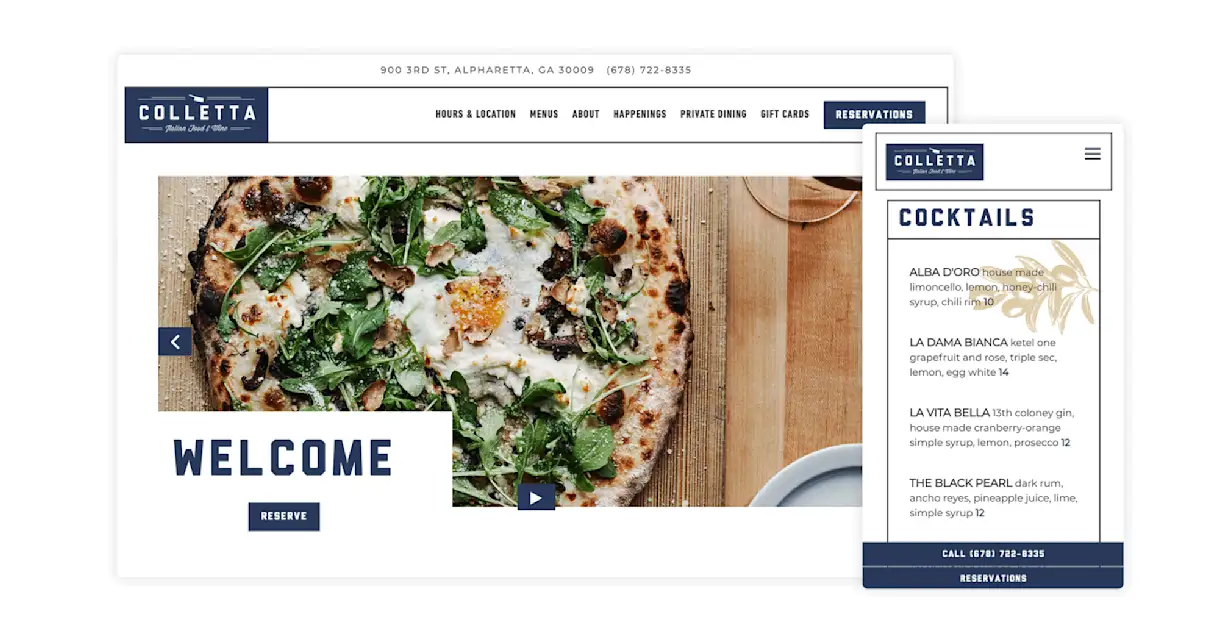
Mobile-friendliness is one of the main ways that Google determines which websites show up on the first page of search results. It’s important that your restaurant website be responsive to different devices and fast to load. You can test your website with Google’s Mobile-Friendly Testing Tool.
In addition to being a ranking factor for SEO, a mobile-friendly website is also crucial because almost 60% of customers visit a restaurant’s website from their mobile devices. A poor mobile experience leads to lost customers and ultimately less revenue.
2. Use keywords that best describe your restaurant.
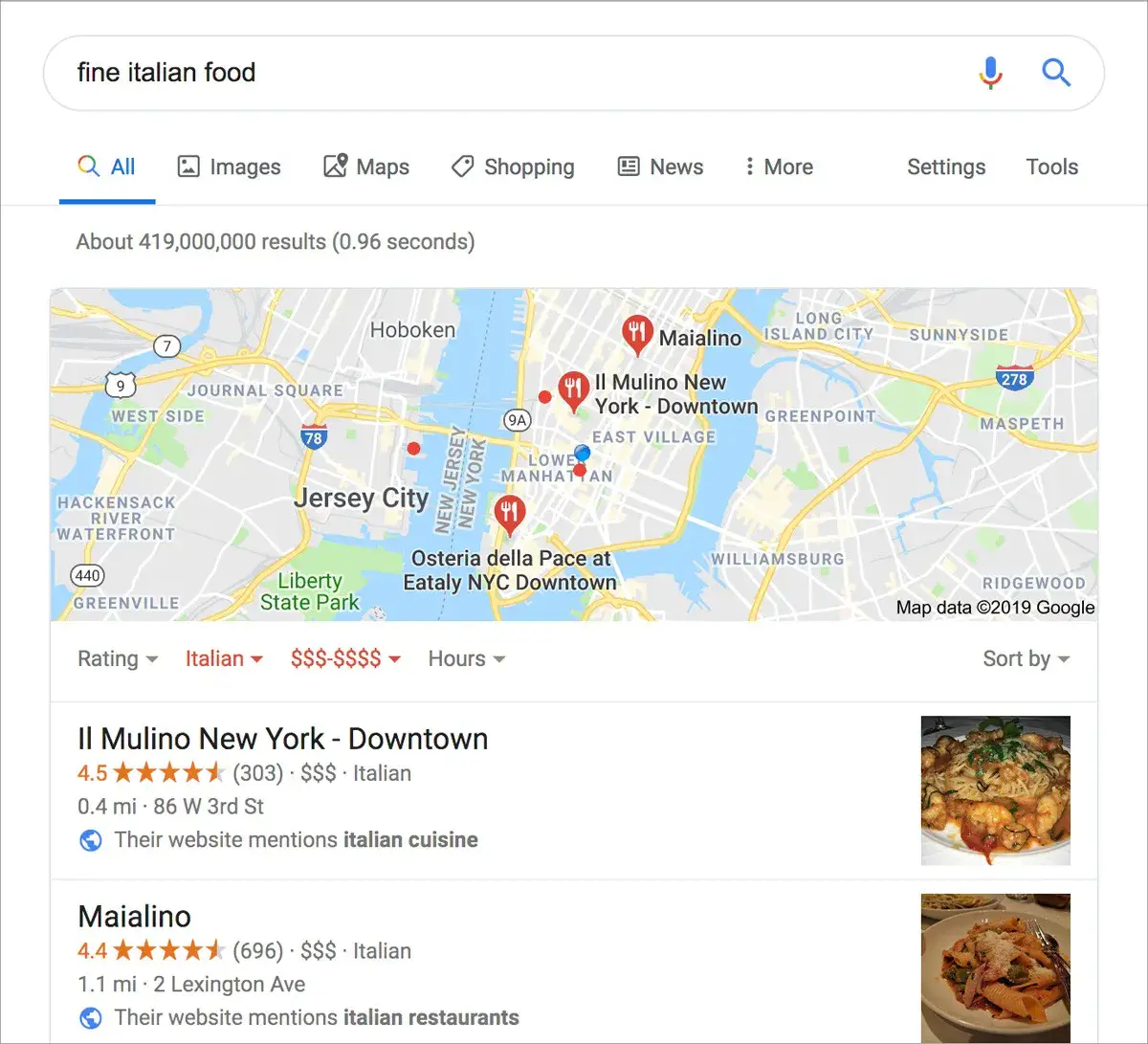
Just because you think your restaurant should rank for "fine Italian food" doesn't mean that search engines do too. Use Google Trends to find real, metric-based info on what keywords are being searched in your geo-region or scour your own restaurant's reviews on Google and Yelp.
What keywords do people use to describe you in reviews? How do people talk about the ambiance, the menu, the service, the decor, etc? Use those same keywords across your site. Appropriate pages to incorporate relevant keywords on your website include your Homepage, an About Us or Our Story page, and a Private Events page.
3. Set up a Google Business Profile.
Entering your information (including your website, menus, etc) into a Google Business Profile is important to local rankings. Don’t forget to add your menu URL in the "Info" tab. If your Google Business Profile restaurant menu items show up on the mobile version of your listing, you also need to make sure to keep those item names and prices up-to-date. LocalSync is a great way to simply update menus, hours, and location across GMB, Foursquare, and Facebook when you update that info on your website.
Restaurant owners can also sign up for Google Search Console (GSC). GSC has a ton of useful and actionable search data including real keywords clicked, impressions for particular keywords, click-through rate, top pages, indexing issues, etc. If that’s more information than you’re looking for, a simple restaurant dashboard from your website provider can show you high-level website traffic that’s easy to understand and digest.
4. Use appropriate schema markup on your pages.
Schema markup is “code that describes elements on your website into a language that all major search engines understand.” Essentially, it communicates how your website is organized and that information is used to calculate where you’ll rank in search results.
Many DIY website platforms have clunky HTML coding where you’re responsible for managing some technical elements. If you’d prefer to avoid some of these tasks that feel better suited for a software engineer, then you’ll want to work with a reputable platform that has schema markup built into the tool.
BentoBox supports schema markup for menus, reservations, hours, locations, and several other important aspects, and it’s automatic to the website templates.
5. Encourage reviews, interactions, and social mentions.
Google measures this engagement as a degree of overall site health. The more people are talking about your business, the more likely Google is to understand that the website is important and relevant. Encourage reviews across social platforms like Facebook, Instagram, and Twitter as well as Google My Business, Yelp, and Tripadvisor.
6. Ditch the PDFs for text-based menus.
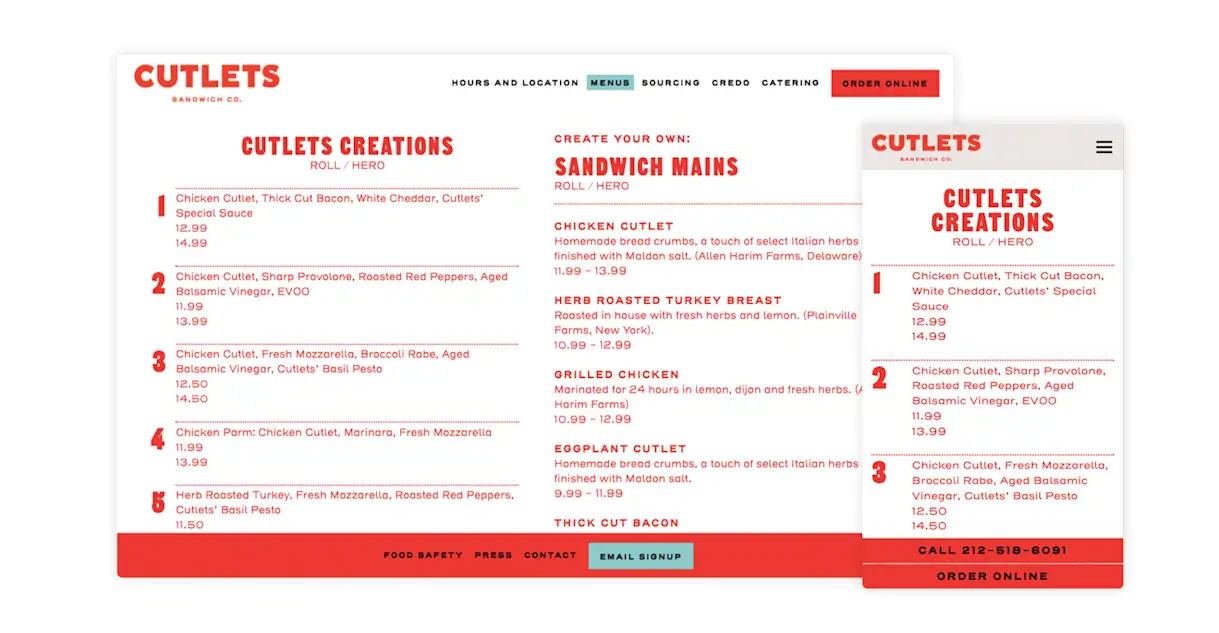
Many guests will search for a menu before making a reservation, so it’s important for your menu’s keywords to rank highly on search results. Having a separate page on your website dedicated to your menu will help increase search rankings, but only if the menu is in the right format for Google to read it.
It's better to have text-based menus instead of image-based menus. To ensure search engines can find and read your menu, don’t upload it as PDF. Writing text-based menus either through HTML code or using a website tool makes it easy for search engines to understand what your menus say — positively affecting SEO. As an additional bonus, it also helps the user experience.
Menus are among the top pages visited on a restaurant’s website, so they need to be easy to read (no more pinching and zooming on the screen) and easy to navigate from section to section. Cutlets is a New York City-based casual deli. Their online menu is a great example of how simple yet functional text-based menus can be.
7. Pitch local media and build a press page.
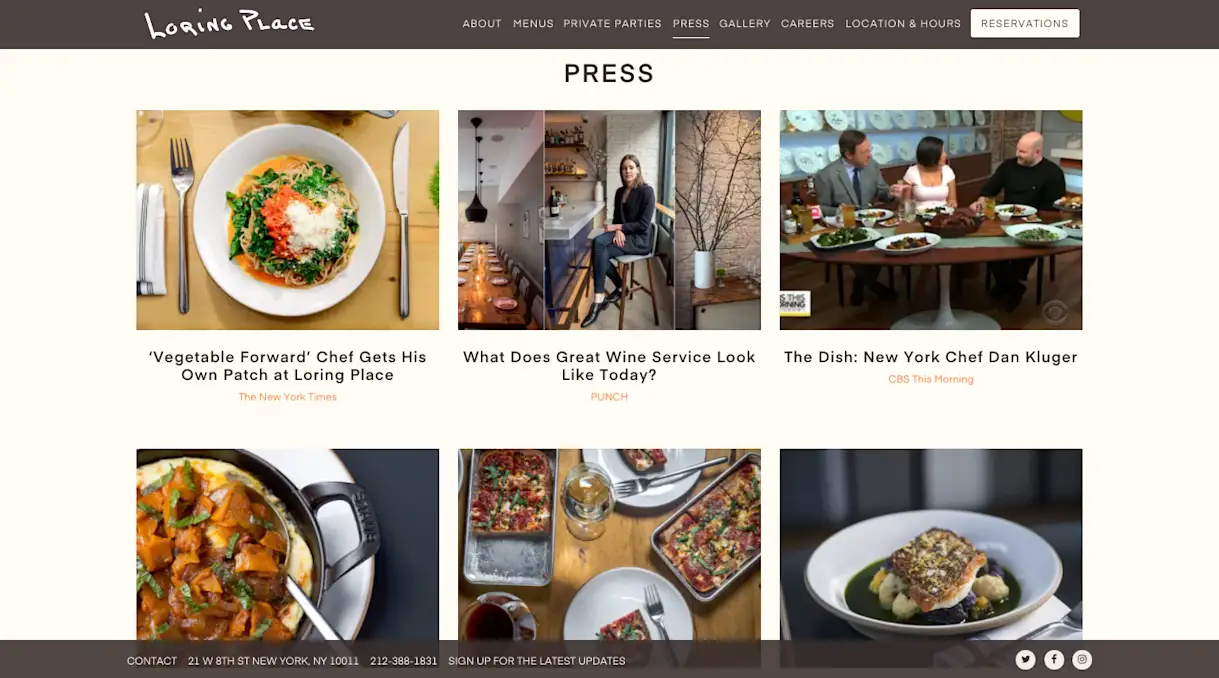
Another way that Google decides whether your restaurant’s website will show up on the first page of search results is through the reliability of your site. The higher in reliability your website scores, the higher it will rank. One metric used in the reliability calculation is backlinks.
Imagine backlinks as “endorsements” from one website to another. Ever notice how an online food magazine will link to a restaurant’s website when it mentions that restaurant in the article? They’re not only trying to help their readers, they’re also trying to boost their reliability score (and in doing so, this improves the restaurant’s reliability score, too). This relationship works both ways, so it’s important to add press hits to your restaurant’s website. It’s a win-win all around.
8. Label website pages properly.
Search engines are looking for clean, well organized, clearly labeled websites. Having separate pages for reservations, menus, online ordering and locations helps generate organic site links (the other links that show up underneath your first result when guests search your restaurant’s name), which means that more links associated with your restaurant will show up when people search for your restaurant.
Google must understand what your pages are and what purpose they serve. This is particularly important for your location page because Google needs to understand all the details that come with that (name, address, phone number, associated special events, or special menu items that are exclusive to that location).
Boost Your Restaurant’s SEO
Understanding SEO and how it can impact your restaurant in search results is important to the success of your business and online visibility. BentoBox is here to help you out along the way. Get in touch with us to learn more about restaurant websites and how we use SEO best practices in our designs.

BentoBox Marketing & Commerce Platform
Deliver Smarter Hospitality
Want to stand out online, bring in more money, engage your diners, and streamline operations?
Recommended
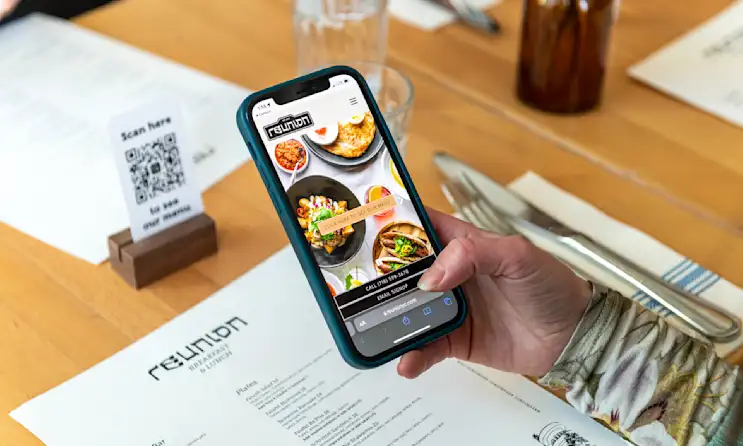
Marketing
9 Ways to Grow Your Restaurant's Email List
February 22, 2023
The first step to good email marketing is a great email list. Read these tips for easy ways to grow your audience.
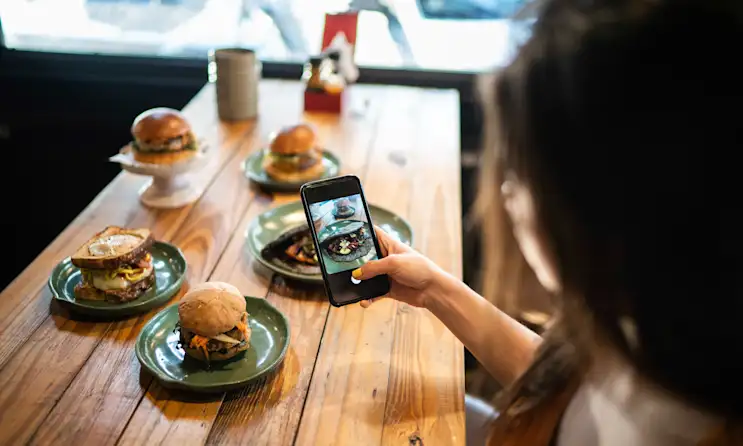
Marketing
A Restaurant’s Guide to Influencer Marketing
February 1, 2023
Influencer marketing should be part of your restaurant’s overall marketing strategy. Here’s how to get started and find the right collaborations.

Marketing
13 Best Marketing Agencies for Your Restaurant
October 13, 2022
Need more support for your restaurant’s marketing efforts? Here are some marketing agencies that fit the bill.


